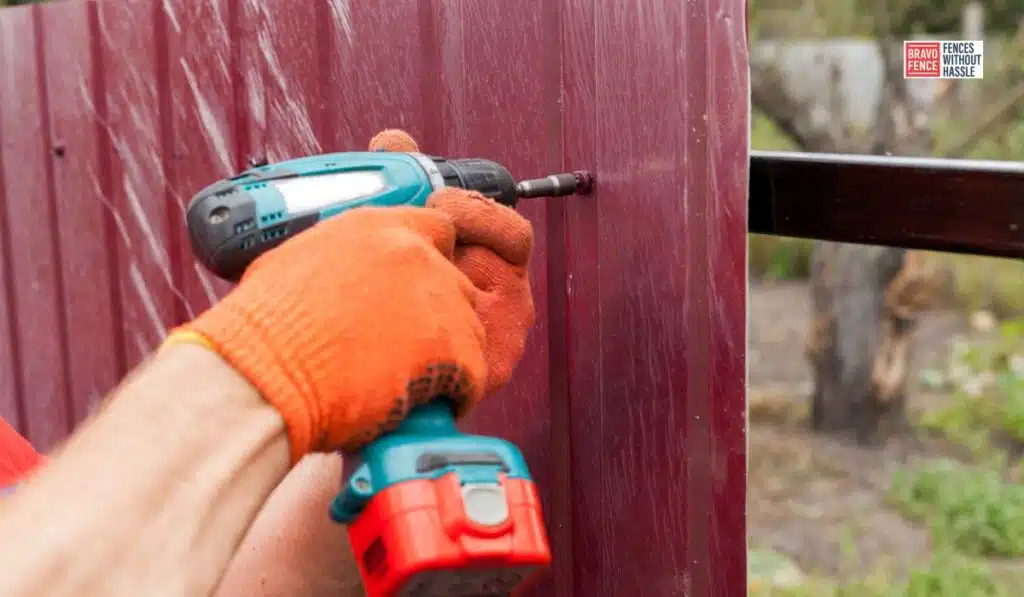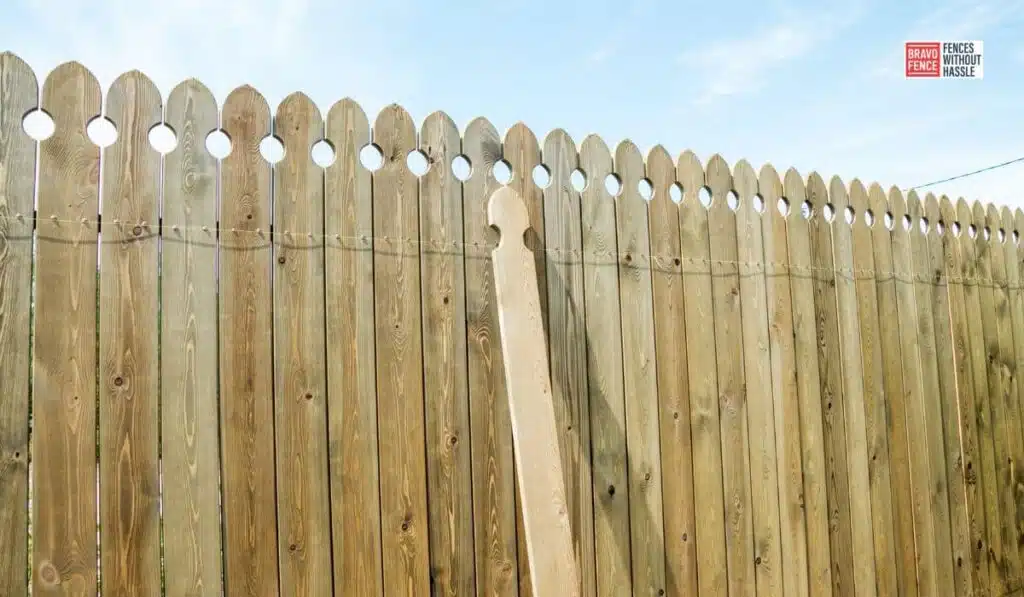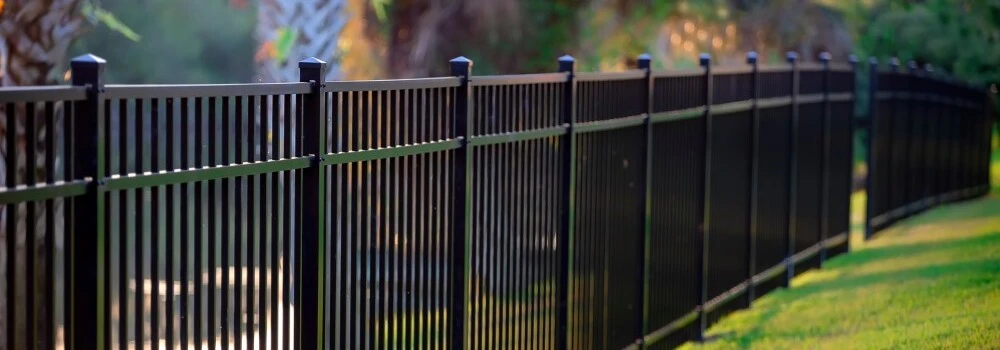
Selecting the Ideal Fence Material for Your Commercial Property
Selecting the appropriate fence material for your commercial property is a crucial decision that can impact security, aesthetics, and maintenance costs.
With various options available in the market, it’s essential to understand the unique features and benefits of each material to make an informed choice.
This article aims to guide property owners through the selection process by highlighting the key factors to consider when choosing suitable fence material for their commercial property.
Factors to Consider:
Security Requirements:
- The primary purpose of a fence for a commercial property is often security. Assess the level of security needed based on the nature of your business and location.
- Materials like steel and aluminum offer high security due to their durability and strength, making them suitable for properties requiring maximum protection.
- Chain-link fences provide visibility while still offering a level of security, making them ideal for properties where surveillance is essential.
Aesthetic Appeal:
- The appearance of your fence can significantly impact the overall look of your commercial property.
- Wood fences exude a classic and natural charm, making them suitable for properties with a rustic or traditional aesthetic.
- Vinyl fences offer versatility in design and color options, allowing property owners to customize the wall to complement the architectural style of their building.
- Ornamental iron fences provide an elegant and sophisticated appearance, making them ideal for upscale commercial properties.
Maintenance Requirements:
- Consider the ongoing maintenance needs of the fence material to ensure it remains in optimal condition over time.
- Wood fences may require regular staining or painting to maintain their appearance and protect against weathering.
- Vinyl and aluminum fences are low-maintenance options that only require occasional cleaning with soap and water to keep them looking new.
- Steel fences are durable but may require rust-proof coating or painting to prevent corrosion, particularly in high-moisture environments.
Durability and Longevity:
- Invest in a fence material that can withstand the elements and last for many years to come.
- Steel fences are highly durable and resistant to weather damage, making them suitable for properties located in areas prone to harsh weather conditions.
- Aluminum fences offer similar durability to steel but are lighter in weight and resistant to rust and corrosion.

- Vinyl fences are impervious to rot, insects, and moisture, making them an excellent long-term investment for commercial properties.
Cost Considerations:
- Evaluate the initial cost as well as long-term expenses associated with maintenance and repairs when determining the overall cost-effectiveness of fence material.
- Chain-link fences are often the most affordable option upfront but may require more frequent repairs and maintenance compared to other materials.
- While the initial cost of wood fences may be lower, ongoing maintenance expenses can add up over time.
- Aluminum and vinyl fences may have a higher upfront cost but offer long-term savings due to their minimal maintenance requirements.
Local Regulations and Zoning Requirements:
- Before installing a fence on your commercial property, it’s essential to familiarize yourself with local regulations and zoning ordinances governing fence height, material, and placement.
- Certain areas may have restrictions on fence height or materials allowed, so it’s crucial to ensure compliance with these regulations to avoid potential fines or legal issues.
- Consult with your local planning department or zoning board to obtain necessary permits and approvals before proceeding with the fence installation.
Environmental Impact:
- Consider the environmental impact of different fence materials, mainly if your commercial property is located in a sensitive ecosystem or conservation area.
- Wood fences, while natural and biodegradable, may contribute to deforestation if not sourced sustainably. Look for options certified by organizations like the Forest Stewardship Council (FSC) to ensure responsible forestry practices.
- Vinyl and aluminum fences are often made from recycled materials and can be recycled themselves at the end of their lifespan, making them eco-friendly choices for environmentally conscious businesses.
- Evaluate the carbon footprint associated with manufacturing and transporting each fencing material to minimize environmental impact.
Noise Reduction:
- In areas with high levels of noise pollution, such as near busy roads or industrial zones, consider selecting a fence material that can help reduce sound transmission.
- Solid materials like wood or vinyl provide better sound insulation compared to chain-link or ornamental iron fences, which offer less resistance to noise.
- For maximum noise reduction, consider installing a wall with additional soundproofing features, such as double-layered panels or specialized acoustic barriers.
Customization Options:
- Explore the customization options available for each fencing material to tailor the design to your specific preferences and branding.
- Many fence materials offer options for custom colors, textures, and decorative elements to create a unique and personalized look for your commercial property.
- Incorporate company logos, signage, or decorative motifs into the fence design to enhance brand visibility and create a cohesive aesthetic with the surrounding architecture.
Warranty and Guarantees:
- Review the warranty and guarantees offered by manufacturers or contractors for each fencing material to ensure protection against defects and premature wear.
- Choose a reputable supplier or installer that provides comprehensive warranties covering materials and artistry for an extended period.
- Consider the terms and conditions of the warranty, including coverage for repairs, replacements, and labor costs, to make an informed decision about the long-term reliability of the fence material.
Maintenance Access and Ease of Installation:
- Consider the accessibility of your commercial property for maintenance and installation when selecting a fence material.
- Certain materials may require specialized equipment or expertise for installation, which could impact both the timeline and cost of the project.
- Evaluate the accessibility of the fence line and surrounding terrain to determine the feasibility of installation and ongoing maintenance tasks such as painting, cleaning, or repairs.
Compatibility with Security Features:
- If your commercial property requires additional security features such as electronic gates, surveillance cameras, or access control systems, consider the compatibility of the fence material with these components.

- Some fence materials, such as steel or aluminum, may offer built-in features for integrating security devices, while others may require modifications or additional support structures.
- Work with security professionals to design a comprehensive security system that seamlessly integrates with your chosen fence material to maximize protection for your property.
Conclusion
Choosing the suitable fence material for your commercial property involves careful consideration of factors such as security needs, aesthetic preferences, maintenance requirements, durability, and cost.
By weighing these factors and consulting with fencing professionals, property owners can select a fence material that not only enhances the security and appearance of their property but also provides long-lasting value and peace of mind.
Whether it’s steel, aluminum, vinyl, wood, or chain-link, the perfect fence material is out there to meet the unique needs of every commercial property.
For expert guidance and assistance in selecting and installing the ideal fence for your business, contact us at Bravo Fence Company.
FAQs
What factors should I consider when choosing a fence material for my commercial property?
When selecting a fence material, consider factors such as security requirements, aesthetic appeal, maintenance needs, durability, cost considerations, local regulations, environmental impact, noise reduction, customization options, warranty, ease of installation, and compatibility with security features.
How do I determine the security requirements for my commercial property?
Assess the level of security needed based on the nature of your business and location. Materials like steel and aluminum offer high security due to their durability and strength. Chain-link fences provide visibility while still offering a level of security, ideal for properties where surveillance is essential.
What are the aesthetic options available for commercial property fences?
Wood fences offer a classic and natural charm, vinyl fences provide versatility in design and color options, and ornamental iron fences offer an elegant appearance. Choose a material that complements your building’s architectural style and enhances the overall look of your property.
How can I minimize maintenance requirements for my commercial property fence?
Opt for low-maintenance materials like vinyl and aluminum that only require occasional cleaning with soap and water. Consider the long-term maintenance needs, such as staining or painting for wood fences, and invest in a material that suits your maintenance capabilities and budget.
Which fence materials are the most durable and long-lasting?
Steel fences are highly durable and resistant to weather damage, suitable for properties located in areas prone to harsh weather conditions. Aluminum fences offer similar durability but are lighter in weight and resistant to rust and corrosion. Vinyl fences are impervious to rot, insects, and moisture, making them an excellent long-term investment.
How do I evaluate the cost-effectiveness of different fence materials?
Consider both the initial cost and long-term expenses associated with maintenance and repairs. While chain-link fences may be the most affordable upfront, wood fences may have lower initial costs but higher maintenance expenses over time. Aluminum and vinyl fences may have a higher upfront cost but offer long-term savings due to minimal maintenance requirements.
What are the zoning requirements I need to consider before installing a fence?
Familiarize yourself with local regulations and zoning ordinances governing fence height, material, and placement. Obtain necessary permits and approvals from your local planning department or zoning board to ensure compliance and avoid potential fines or legal issues.
How can I minimize the environmental impact of my commercial property fence?
Choose eco-friendly options like vinyl and aluminum, which are often made from recycled materials and can be recycled themselves at the end of their lifespan. Look for materials certified by organizations like the Forest Stewardship Council (FSC) to ensure responsible forestry practices.
What customization options are available for commercial property fences?
Explore options for custom colors, textures, and decorative elements to create a unique and personalized look for your property. Incorporate company logos, signage, or decorative motifs into the fence design to enhance brand visibility and create a cohesive aesthetic with the surrounding architecture.
How do I ensure the reliability of the fence material I choose?
Review the warranty and guarantees offered by manufacturers or contractors, considering coverage for materials, artistry, repairs, replacements, and labor costs. Choose a reputable supplier or installer that provides comprehensive warranties for an extended period.
Tags: Complete Guide to Commercial Fence Maintenance, Complete Guide to Commercial Gate Systems, Complete Guide to High Security Fences, Complete Guide to Security Fence Installation, Everything You Need to Know About Chain Link Fences For Businesses, Everything You Need to Know About Commercial Fencing Regulations, Everything You Need to Know About Perimeter Protection For Businesses, Explore Helpful Resources on Commercial Fence Contractors, Explore Helpful Resources on Commercial Property Boundaries, Explore Helpful Resources on Privacy Fencing For Offices, Top Ideas and Insights About Business Security Fencing, Top Ideas and Insights About Industrial Fencing Solutions
